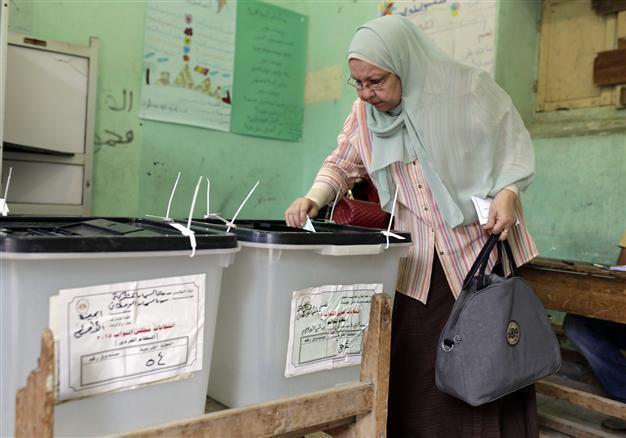Polling begins in Egypt to elect new pro-Sisi parliament
CAIRO - Agence France-Presse

An Egyptian casts her vote in the first round of parliamentary elections at polling station in Giza, Cairo, Egypt, Sunday, Oct. 18, 2015. (AP Photo/Amr Nabil)
Polling opened on Oct. 18 in Egypt for a much-delayed parliamentary election that will tighten President Abdel Fattah al-Sisi's grip on power after he crushed all opposition since ousting his Islamist predecessor.The vote for the 596-member parliament will be staged in two phases ending on December 2, with Egyptians abroad casting their votes for the first round from Oct. 17.
But with an absence of opposition parties -- including the now-banned Muslim Brotherhood -- polling has inspired none of the enthusiasm witnessed for Egypt's first democratic elections in 2011.
Experts say only voter turnout will be a gauge of popularity for Sisi, who has enjoyed a cult-like status since being elected president last year.
Most of the more than 5,000 candidates in the polls overwhelmingly support Sisi and are expected to dominate parliament.
"This parliament will be a parliament of the president," said Hazem Hosny, political science professor at Cairo University.
"It's really a parliament... to keep things as they are, to give an image of democracy."
Many Egyptians tired of political turmoil since the 2011 ouster of veteran leader Hosni Mubarak support Sisi, who has vowed to revive an ailing economy and restore stability amid a deadly crackdown targeting supporters of his Islamist predecessor Mohamed Morsi.
Morsi, Egypt's first freely elected civilian leader, was ousted by then army chief Sisi on July 3, 2013, after mass street protests against his divisive year-long rule.
An ensuing government crackdown overseen by Sisi and targeting Morsi's Muslim Brotherhood movement left hundreds dead and thousands jailed.
Hundreds more including Morsi have been sentenced to death after speedy trials, which the United Nations denounced as "unprecedented in recent history".
Sisi, meanwhile, won a presidential election in 2014.
Scores of policemen and soldiers have been killed in jihadist attacks since the crackdown on Islamists began, with the Egyptian affiliate of the Islamic State of Iraq and the Levant (ISIL) leading a deadly insurgency in North Sinai.
The constitution empowers parliament to move a no-confidence motion against the president and also gives lawmakers 15 days to review all presidential decrees.
But experts say the ability of parliamentarians might be close to zero given the absence of any real opposition.
The Brotherhood dominated the last assembly but is now been banned after being blacklisted as a "terrorist organisation," while leftist and secular movements that led the 2011 uprising are boycotting or are badly represented in the polls.
The Brotherhood had been the main opposition force for decades, fielding candidates in parliamentary elections under Mubarak despite an official ban.
It took 44 percent of seats in the first free democratic elections following Mubarak's ouster in 2011.
That parliament was dissolved in June 2012, but the Brotherhood's popularity shone through days later when Morsi, a civilian, was elected, putting an end to six decades of presidents coming from military ranks.
As Egyptians abroad started casting their ballots on Oct. 17, Sisi appeared on television calling on citizens to vote.
"Celebrate the choice of representatives and make the right choice," he said.
"I am expecting Egyptian youth to be the driving force in this celebration of democracy."
Of the 596 lawmakers being elected, 448 will be voted in as independents, 120 on party lists, and 28 will be presidential appointees.
The main coalition is the pro-Sisi For the Love of Egypt, which includes the liberal Free Egyptians Party founded by telecom tycoon Naguib Sawiris, and Al-Wafd Party, also liberal. It aims to win two-thirds of the seats.
The Egyptian Front, led by Ahmed Shafiq, Mubarak's last premier, is another key coalition, and the openly pro-Sisi Salafist Al-Nur party that backed Morsi's ouster is the only Islamist party standing.
About 55 million voters are eligible to cast their votes in the two-stage election across the country's 27 provinces, with polling in the first stage to be held over two days.
Any run-off in the first phase will be contested on October 27-28. The second phase starts on November 21.
















